Vol 4 No. 45 TROPIC LIGHTNING NEWS November 10, 1969
Index
CU CHI - Enemy soldiers near the Cambodian
border are practicing their own brand of escape and evasion, but they have two
gauntlets to run - forces from Tropic Lightning’s 3d Brigade and their own
brothers-in-arms, other communist soldiers.
“More and more enemy soldiers are rallying to the Government of Vietnam every
day,” said a 3d Brigade intelligence officer, “but they’re finding it harder and
harder to break free from their units to get to a Chieu Hoi Center.”
INTELLIGENCE AGENTS have heard that many enemy
deserters are living in a section of Ba Thu, a Cambodian border town frequented
by North Vietnamese Army main force units.
They have congregated, waiting for the chance to slip across the border and
through many traps, both friendly and enemy, to surrender under the open arms
program.
IF A MAN IS lucky enough to by-pass the border
guards, he is likely to bump into liaison runners who immediately ask the future
rallier where his unit is and why he isn’t with it.
“We’ve been led to believe that some sort of pass is required for a man to be
unaccompanied near the border,” officials said.
What’s making the enemy rally? He’s not as dedicated as he used to be, and
his living conditions aren’t good at all, according to spokesmen:
“He’s been pushed into the hostile, swampy regions west of the Vam Co Dong
River and even the hardy Viet Cong and NVA can’t survive for extended periods of
time in this area. They have to come out once in awhile, and when they do they
risk death.”
ONE TESTIMONIAL to the zeal ralliers have was
discovered recently when two hoi chanhs from Hau Nghia Province were found at
the Tay Ninh Chieu Hoi Center, many miles away.
“They said the line was too long at the Bao Trai Chieu Hoi Center and they
didn’t want to wait. Obviously,” an official said, “once a man sets his mind on
rallying, nothing short of death can stop him.”
St. Charles and Dragons: A Grim Tale for VC
 |
| FLYING DRAGONS - Soldiers of the 2d Battalion, 14th Infantry get a lift on their way to a reconnaissance in force mission. (PHOTOS BY SP4 FRANK DITTO) |
 |
Allies Nail 17 in Ho Bo
By SP4 RAY BYRNE
CU CHI - Men from Bravo and Charlie Companies of
the Fire Brigade Golden Dragons combined forces with Stinger gunships, the Air
Force and the 3d Company of the 2d Battalion, 49th ARVN Regiment recently to
kill 17 Viet Cong holed up in the Ho Bo Woods.
From the time Charlie Company eagle-flighted into a hot landing zone until it
was picked up once again, it was an action-packed day.
Many spider holes were uncovered, one containing the body of a female Viet
Cong.
The Bravo infantrymen swept into an adjacent area and came across a
well-camouflaged and fortified bunker complex that proved to be an enemy R & R
center.
“There was even a makeshift picnic table,” said Private First Class Mike
Bartosch of Waterloo, Mich. Several Viet Cong were routed out of one spider
hole given away by a freshly-cut tree stump.
The three-company operation was an attempt to clear the area of possible
enemy staging points.
41st Wink Is Fatal to NVA
By PFC GREG STANMAR
CU CHI - The din of a company of GIs and a
squadron of armored personnel carriers was not enough to awaken an enemy sentry
recently.
The result of his sound sleeping habit was five NVA dead.
Action started when Delta Company, 2d Battalion, 14th Infantry was sweeping
an area near Cu Chi with their transportation, APC’s from the 10th Armored ARVN
Regiment, close at hand. The company spotted the sentry asleep in a hedgerow.
He awoke and resisted capture, along with another NVA who’appeared on the
scene. They were downed with small arms fire. A third NVA soldier gave himself
up.
Four more enemy were observed heading for cover. One of the four then gave
himself up. Rockets of two Cobra gunships ended the resistance of the remaining
three. In addition to the two detainees, three AK-47’s were found.
This was the second joint operation of Delta Company and the ARVN armor unit.
Bobcats Rip Hunk From VCI
By PFC RICH FITZPATRICK
CU CHI - The enemy depends on the Viet Cong
Infrastructure (VCI) to provide him with food and shelter.
When VCI personnel are captured or killed, it is a double victory; the
fighters waiting for supplies and a place to hide are also defeated.
Just such a victory happened in the Bau Dieu area when the Fire Brigade, 1st
Battalion (Mechanized), 5th Infantry, the 65th Engineer Battalion, and the 132d
Vietnamese Regional Forces teamed up to bring in seven detainees and total a
body count of seven as well.
Early that morning on a reconnaissance mission, elements of the Bobcat Alfa
Company brought two detainees out of a bunker.
The Mech called in the RFs, who were in the vicinity with a rome plow crew
from the engineers. The combined units combed the region carefully. The
detainee took the Vietnamese Forces to a hidden bunker that sheltered three VCI.
Efforts to persuade the men to rally to the government were answered with
hand grenades. The three enemy, one of whom was the VC chief of Phouc Hiep
Village, died in their resistance.
While the rome plow was busy uncovering a hole that contained two more VC, an
enemy soldier threw a grenade at the dozer and wounded the driver. The Bobcat
element carefully checked the site and recorded four more enemy KIA.
Captain Ralph Laubecker, Bobcat Intelligence Officer, said, “This victory
eliminating the effectiveness of the VCI will severely cripple enemy activity in
the Cu Chi district. Without the infrastructure to get food and hiding places,
the Viet Cong will not be able to conduct effective operations here.”
Cache Find Is Sew-Sew
CU CHI - “You guys won’t even believe what I
found in this bunker,” said Sergeant Severin (Skip) Erickson as he peeked out of
an underground chamber.
In a large bunker, he found two sewing machines set up to patch Viet Cong
clothing, plus a workshop for constructing mines and boobytraps.
There were also more than 200 pounds of rice, new men’s and women ‘s clothing
and five pounds of medical supplies.
The Golden Dragons’ Bravo Company found the cache near Fire Support Base
Patton II.
| There is a wise old saying that says if you go wandering around the perimeter at night, you’re looking for trouble. The night guards are also looking for trouble and someone sneaking around in the dark is trouble. Stay away from the wire at night unless you have business there and guards know you’re coming. DEROS. Do it the safe way. |
Page 2 TROPIC LIGHTNING NEWS November 10, 1969
Decorated
| SILVER STAR | |
| CPT Thomas H. Grace, Co A, 2d Bn, 34th Arm | CPT Thomas J. Sinclair, D Trp, 3d Sqdn, 4th Cav |
| DISTINGUISHED FLYING CROSS |
|
|
WO1 Eric G. Brethen, D Trp, 3d Sqdn, 4th Cav WO1 Gary A. Jones, D Trp, 3d Sqdn, 4th Cav SP5 Stephen R. Snoddy, D Trp, 3d Sqdn, 4th Cav |
SP4 Dannie D. Barnhardt, D Trp, 3d Sqdn, 4th Cav SP4 Thomas M. Pregent, D Trp, 3d Sqdn, 4th Cav SP4 Rockley J. Rhoes, D Trp, 3d Sqdn, 4th Cav |
| SOLDIER'S MEDAL |
|
|
MAJ James B. Maharrey, HHC, 2d Bn, 34th Arm CPT Donald H. Dwiggins, HHC, 2d Bn, 34th Arm |
CPT Howard C. Lewis, HHC, 2d Bn, 34th Arm SSG Cecil T. Stiles, HHC, 2d Bn, 34th Arm |
|
BRONZE STAR FOR HEROISM |
|
|
2LT Roland L. Roberts Jr., Co A, 3d Bn, 13th Arty WO1 Robert N. Betts, 25th MI Det PSG Dennis Johnson, Co A, 2d Bn, 12th Inf SSG Richard Caravalho, Co A, 2d Bn, 12th Inf SSG Coy R. Jackson, Co A, 2d Bn, 34th Arm SSG William A Talada, Co B, 2d Bn, 14th Inf SSG William B. Puckett, Co B, 2d Bn, 14th Inf SGT William L. Berry, Co A, 2d Bn, 34th Arm SGT Robert C. Brozier, Co B, 2d Bn, 14th Inf SGT Gary P. Hershberger, Co A, 2d Bn, 34th Arm SGT Wayne E. Hort, Co B, 2d Bn, 14th Inf SGT William P. Kraws, Co B, 2d Bn, 14th Inf SGT David R. Leonard, Co B, 2d Bn, 14th Inf SGT Morris Perry, Co A, 2d Bn, 34th Arm SGT Danny J. Thompson, Co A, 2d Bn, 34th Arm SP5 Charles D. Vierra, D Trp, 3d Sqdn, 4th Cav SP4 Charles Acheson, HHS, 3d Bn, 13th Arty |
SP4 Robert K. Cochron, Co A, 2d Bn, 34th Arm SP4 Larry D. Dewale, Co B, 2d Bn, 14th Inf SP4 John P. Herren, Co B, 2d Bn, 14th Inf SP4 Jim Hood, Co B, 2d Bn, 14th Inf SP4 Steven Leapley, HHS Btry, 3d Bn, 13th Arty SP4 Charles Loy, Co A, 2d Bn, 34th Arm SP4 James L. Patton, D Trp, 3d Sqdn, 4th Cav SP4 William C. Riffle, Co A, 2d Bn, 34th Arm SP4 Glenn Rigby, Co C, 2d Bn, 14th Inf SP4 Stanley A. Shultz, Co B, 2d Bn, 14th Inf SP4 James T. Shukosky, Co E, 2d Bn, 14th Inf PFC Jerry L. Basler, Co E, 2d Bn, 14th Inf PFC Patrick ‘Gledton, Co A, 2d Bn, 34th Arm PFC John Keysaw, Co A, 2d Bn, 12th Inf PFC Wayne R. Luber, Co B, 2d Bn, 14th Inf PFC Jimmie W. Pierce, Co C, 2d Bn, 14th Inf |
TROPIC LIGHTNING
Combat Honor Roll
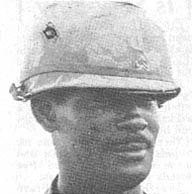 Staff Sergeant Jon M. Davis, a platoon sergeant with Company C, 2d Battalion,
14th Infantry, has been added to the Tropic Lightning Combat Honor Roll.
Staff Sergeant Jon M. Davis, a platoon sergeant with Company C, 2d Battalion,
14th Infantry, has been added to the Tropic Lightning Combat Honor Roll.
During a reconnaissance mission, a man in Davis’ company tripped a
well-concealed booby trap, and was seriously burned by a white phosphorous
grenade.
Davis immediately moved to his stricken comrade, extinguishing his flaming
clothing. After the man had been evacuated from the area, the unit continued on
its mission, but the action wasn’t over.
As the company entered a thicket, contact was made with a squad of North
Vietnamese Army soldiers. Davis quickly deployed his men into strategic
positions and directed their fire on the aggressors.
While throwing hand grenades and placing small arms fire on the hostile
force’s emplacements, Davis effectively kept control of his men, thwarting the
enemy’s attack.
Tropic Lightning Tots
The Commanding General Welcomes
The Following Tropic Lightning Tots
To The 25th Infantry Division – As
Reported By The American Red Cross.
Born To:
| SF5
James P. Riggs, A 725th Mnt, boy, Oct. 23 SP5 William A. O’Conner, A 25th S&T, girl, Oct. 24 SP5 David Cuellar, 25th Admn, girl, Oct. 24 SP5 Carlton Glover, C 725th Mnt, girl, Oct. 26 SP5 Joel Walters, 372d RR, girl, Oct. 28 PFC Jack S. Strickland, B 1/27, boy, Oct. 28 SP4 Charles S. Acheson, C 3/13, girl, Oct. 29 CFC E. D. Guy, Red Cross, grandson, Oct. 29 |
A Time for Reflection
Veterans Day: Its Meaning
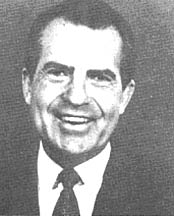 |
 |
 |
| For
51 years, we have observed November 11th - the day the armistice was
signed concluding World War I - as an occasion to honor the men and women
who have served with distinction in the armed forces of the United
States. It is a time when we pause to pay tribute to all veterans who
have struggled - from Valley Forge to Vietnam - to defend the liberties of
the American people. Those who wear the uniform of the United States have been called upon to serve far from home and loved ones to protect our birthright of freedom. Their courage, devotion to duty, and strength in the face of hardship command the respect and admiration of a grateful people. On this Veterans Day, as we honor those who have served so well, let us remember that our veterans have given Americans a chance to build toward the goal that all of us seek: peace. Richard M. Nixon |
On this November 11th, all citizens of our Nation will have the
opportunity to honor the veterans of our Armed Forces. This is indeed an
appropriate time for prayerful reflection on the contribution which they
have made to our security throughout our history. America must never forget the legions of brave men and women who have served in our Armed Forces to guarantee our freedom. Their sacrifice stands as an eternal monument to the valor and dedication they have displayed in time of crisis and conflict. Selflessly they have fought against aggression to ensure our survival. This heritage of devoted service brilliantly illustrates the importance of the role which you fulfill today as members of our Armed Forces. Our Nation relies upon each of you to maintain the strength of our defense posture to protect our freedom. Melvin R. Laird Secretary of Defense |
Let us reflect, as we fight and work, on those Americans who served
before us in defense of the freedoms which all of us hold so dear. Today, as we defend those same freedoms with our allies in the Republic of Vietnam, the American serviceman can, perhaps more than any other group of Americans, understand the significance of freedom. Our Vietnamese counterparts have demonstrated their willingness to endure enormous hardships in order to attain their freedom from communist oppression. Your achievements have made this possible and have demonstrated to the people of the world our nation’s determination to defend the institutions of freedom. You have met the challenge with courage and determination and have helped to write a new chapter in the history of man’s relationship to man. Creighton W. Abrams General, USA |
It’s Just Your Bill, GI, Know It Well
Wondering about your benefits under the GI Bill?
The Veterans Administration Information Service says these questions are
among those it is most frequently asked:
QUESTION: As a veteran of Vietnam and two years
active service who did not complete high school before entering the service,
would I be able to finish high school at government expense?
ANSWER: Yes. In fact, there is a special program
set up for Vietnam veterans who have not completed high school. The financial
assistance you receive to get a high school diploma will not use up any of the
benefits you have earned for education after high school.
QUESTION: What is the time limit of the
guaranteed home loan a veteran may obtain from a lending institution, and what
is the maximum time allowed to repay such a loan?
ANSWER: The VA has no limit on the amount
borrowed, but has a limitation on the amount of the guarantee to the lender.
The guarantee may not be more than 60 per cent of the loan and in no event
exceed $12,500. These loan mortages may run up to 30 years.
QUESTION: Can I train for a commercial pilot’s
license under the GI Bill?
ANSWER: Yes, if you have earned enough benefits
and meet the necessary qualifications, first of which is that you possess a
private license or its equivalent. Also you must meet the medical standards
established for a commercial pilot and your training must be approved by the
approving agency of your state.
The TROPIC LIGHTNING NEWS is an authorized publication of the 25th Infantry Division. It is published weekly for all division units in the Republic of Vietnam by the Information Office, 25th Infantry Division, APO San Francisco 96225. Army News Features, Army Photo Features, Armed Forces Press Service and Armed Forces News Bureau material are used. Views and opinions expressed are not necessarily those of the Department of the Army. Printed in Tokyo, Japan, by Pacific Stars and Stripes.
MG Harris W. Hollis . . . . . . . Commanding General
MAJ Warren J Field . . . . . . Information Officer
1LT John C. Burns . . . . . . . . Officer-in-Charge
SP4 Ralph Novak . . . . . . . . . Editor
SP4 Harold O. Anderson . . Assistant Editor
SGT John Genitti. . . . . . . . . . Production Supervisor
BATTALION CORRESPONDENTS
| SP4 Dennis Bries SP4 Bill Frame SGT Bill Obelholzer SP4 Larry Goodson PFC Jim Williams PFC Richard Sears Wally Baker SP4 Frank Ditto PFC Greg Stanmar SP4 Phil Jackson SP4 Pat Morrison SP4 Ken Barron |
2/22 4/23 4/23 2/12 2/12 4/9 2/34 2/14 2/14 2/27 3/13 1/8 |
SP5 Tony DeBlasio PFC Rich Fitzpatrick SP4 Ken Fairman SP4 Brad Yeager PFC Frank Rezzonico PFC Doug Sainsbury PFC Richard Fitzpatrick SGT Larry Goodson SP4 K.C.Cullen SP4 Tony Crawford SP5 Pete Freeman SP4 Craig Sampson |
2/12 1/5 DIVARTY 1/27 1/27 2/27 1/5 2/12 3/22 4/9 7/11 2/27 |
Page 3 TROPIC LIGHTNING NEWS November 10, 1969
Warriors Find Kimosabes in 75th’s Long Rangers
By PFC JIM WILLIAMS
CU CHI - Three Long Range Reconnaissance Patrol (LRRP) teams from Company F,
75th Infantry Airborne Rangers joined the Fire Brigade’s 2nd Battalion, 12th
Infantry Warriors recently in a smashing effort to blow Charlie’s mind.
In a planned four-day operation, the three LRRP units were inserted just
after noon at separate locations to the west of Highway 6A, near Fire Support
Base Pershing. The three sites determined an area about four kilometers square.
SETTING UP an ambush, one team sent out a small recon patrol that found an
assortment of booby traps and trip wires. When the patrol returned to its
original ambush site, it made contact with an unknown size enemy force. One NVA
soldier was wounded and detained.
Finding itself surrounded, the Ranger patrol initiated escape and evasion
tactics and set up a hasty AP about 50 to 100 meters from the contact area.
“Again we exchanged fire with the enemy, killing two in the initial burst of
fire and three more a few minutes later,” said Staff Sergeant Kenneth Cecil of
Louisville, Ky. “We let them come to us and just hit them as they came in.”
WITH THEIR insertion coming right on the heels of the first team, a second
group landed with the Warriors’ Bravo Company. After moving only a short
distance with the Warrior element, the Rangers split off to the north and east
for about 1200 meters.
Sergeant James Badger of Niagara Falls, N.Y., described the scene: “Shortly
after we set up the ambush, we sent out a recon patrol to scout the area. We
found no booby traps, but there were holes and tunnels everywhere.”
The small patrol returned late in the afternoon and shortly thereafter, rain
began to fall.
“ALMOST AS soon as the rain began,” Badger added, “the enemy began firing.
All we could see were muzzle flashes. I think there were about ten of them, but
there was no way of telling for sure.”
A third Ranger team, meanwhile, was prowling its area, but couldn’t scare up
contact during its four day outing.
The other two teams praised the support they received from Centaur and
Diamondhead gunships of the 3d Squadron, 4th Cavalry and the 25th Aviation
Battalion.
“THEY DID A great job,” Badger said. “Our support is the finest in Vietnam.”
After the contact had been broken, the teams were returned to Fire Support
Base Pershing, having accounted for a body count of five NVA while collecting an
assortment of enemy clothing, web gear and AK-47 magazines.
Tank’s Much Rear Security
By SGT Tony Camelio
CU CHI - It isn’t often that Charlie Troop, 3d Squadron, 4th Cavalry will
leave one of its mighty Sheridan tanks behind as rear security, especially on a
day when it is the only tank the troop has with it.
But doing the unexpected paid off for MacKenzie’s Raiders on one recent
operation. Sergeant Henry Lambert of Woonsocket, R.I., of Sheridan tank 17
recalled:
“We were on a reconnaissance-in-force mission in the Citadel area, south of
the Boi Loi Woods when the troop was called upon to check out movement in a
hedgerow about 200 meters to our left front. Since there were several rice
paddies to cross before reaching the hedgerow, and since my tank tends to get
stuck in wet rice paddies, I was instructed by my platoon leader to remain
behind as a security measure.”
It wasn’t long after the troop had passed through the first hedgerow that
Lambert spotted the first VC.
Private First Class Mervyn Sanders of Lansing, Mich., 17’s driver, said, “He
came running out of the same hedgerow the troop had just passed through, running
in the opposite direction, when we opened up with M-60 machinegun fire. Not
long after, another VC tried the same tactics, and he was also stopped by our
fire.”
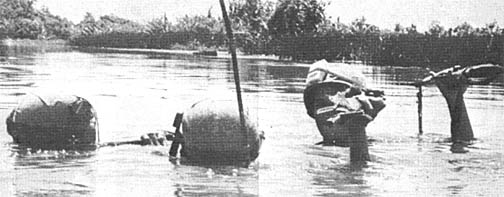 |
| BEING SHORT doesn’t always get it, especially when you’re in a deep canal. Two 2d Battalion Wolfhounds and an ARVN soldier found themselves in that situation during a mission near Cambodia. (PHOTO BY SP4 PHIL JACKSON) |
54th MAT Trains RF Company
By SP4 BOB STEPHENS
BAO TRAI - A Mobile Advisory Team (MAT) here has set up a Vietnamization
program that trains Regional Forces to defend their outposts, use their weapons
and pacify the community.
The program is designed for South Vietnamese forces working with Tropic
Lightning’s 3d Brigade, so they can become better soldiers through advanced
training.
MATS are part of the Military Assistance Command, Vietnam. They usually
include seven or eight men who set up small perimeters in outlying areas.
One team, MAT 54, is now working with the 665th Regional Forces Company a few
miles southeast of Bao Trai. In less than a month, the team has built a
fortified camp, and although it’s presently surrounded by rice paddies, the ramp
will soon be serviced by an access road, according to First Lieutenant Heldon
Jung of El Paso, Tex., the team leader.
MAT 54’S method has been to give instructions while carrying out normal
operations. For instance, when the team was building its base camp, RFs were on
hand to assist and observe. The RFs were able to learn the proper use of barbed
wire, placement of claymore mines and where to set up firing positions.
Even before the camp was finished, MAT 54 was accompanying the RFs on daily
combat and pacification missions.
Short sweeps in the camp’s vicinity are proving to be a valuable aid in
upgrading the Regional Forces. From the Americans, the RFs learn proper use of
artillery and air support, correct patrol formations and effective ambush
techniques.
ONE OF the most important phases of the operation is the combined
pacification project segment. Team 54 has experienced medics who, with their
Vietnamese counterparts, visit the surrounding hamlets and set up temporary
clinics. They are supported by nearby military hospitals that have evacuation
helicopter support.
According to Sergeant First Class A.J. Taylor of Shreveport, La., one of Team
54’s advisors, the program has been successful not only with the RFs but also
with the local civilians.
“Each afternoon, the farmers have been stopping by about three o’clock and
helping fill sandbags and dig bunkers,” Taylor said. “They’ve been very
receptive.”
The Family That Maintains Together Remains Together
By SP4 GARY SCIORTINO
CU CHI - When three brothers are stationed in the same unit, they are bound
to be both a source of confusion and a focal point of local humor. The Fosdick
brothers from Oswego, N.Y. of Delta Company, 725th Maintenance Battalion are no
exception.
Staff Sergeant Donald R. Fosdick, 27, part of a family of nine boys and five
girls, arrived in the company in June 1967. He re-enlisted for his job as the
company’s senior stock control supervisor in February 1968.
SPECIALIST 5 Samuel R. Fosdick, 19, showed up in Delta Company in May 1968.
He is now the company’s senior field artillery repairman.
When a third brother, Specialist 4 Timothy R. Fosdick, 22, was assigned to
1st Battalion, 27th Infantry in mid-October 1969, SSgt. Fosdick and Sp 5 Fosdick
both agreed to extend for six more months if Sp 4 Fosdick was assigned to their
company.
Now there is a rumor that when Delta Company holds reveille in the morning
now, there is one extra platoon that needs to be taken into account - The
Fosdick Platoon.
They are called everything from “The Fearless Fosdicks” to “The Three
Stooges.”
“Each person in the company seems to have a different nickname for us,” said
Sp 4 Fosdick.
THE FOSDICKS’ being stationed together has caused confusion for other
people. Once they went to the PX together, where they showed their I.D. cards
to the girl at the door one after another. The girl thought that they were
carrying forged I.D. cards because they all had the same last names.
In all, SSgt. Fosdick has extended for duty in Delta Company four times, and
Sp 5 Fosdick has extended twice.
“I can never seem to be able to leave this place.” commented SSgt. Fosdick
wistfully. “Every time I get ready to leave - in pops another brother.”
 |
MOM ALWAYS LIKED YOU BEST - The brothers Fosdick, Specialist 5 Samuel (left), Specialist 4 Timothy (center) and Staff Sergeant Donald have a family discussion around a 725th Maintenance Battalion vehicle. (PHOTO BY SP4 GARY SCIORTINO) |
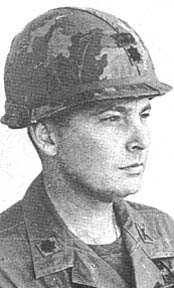 |
NEW REGULAR CO. Lieutenant Colonel Warren A. Jones of Minneapolis has succeeded Lieutenant Colonel Jefferson K. Rogers of Aurora, Colo., as commander of the 3d Battalion, 22d Infantry. Rogers has moved to the Qui Nhon support command. Jones was formerly executive officer of Tropic Lightning’s 3d Brigade. |
Page 4-5 TROPIC LIGHTNING NEWS November 10, 1969
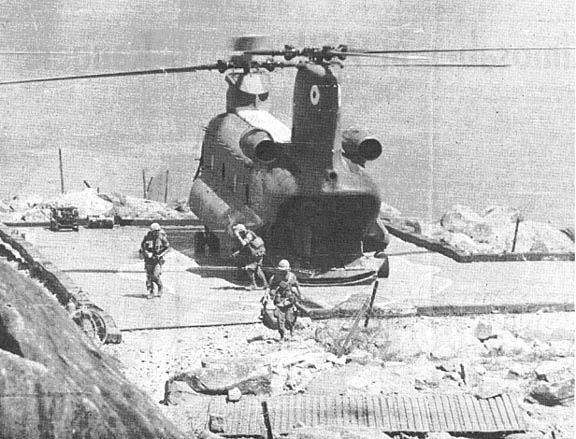 |
|
CH-47 Chinooks brought the troops to the top of the mountain. |
Coming ‘Round the Mountain
‘Operation Cliffdweller’ Drives Enemy
Off the Mountain; Regulars Kill 40
Sounds of machetes slashing through thick underbrush were interrupted by
frequent blasts from exploding grenades. American and Vietnamese soldiers were
making their way across giant boulders and jungle down the northern slope of Nui
Ba Den.
“Operation Cliffdweller,” a multi-battalion endeavor under the operational
control of the 3d Battalion, 22d Infantry’s commanding officer, Lieutenant
Colonel Warren Jones of Minneapolis, had as its purpose the clearing of hundreds
of caves and holes on the mountain’s north side. Forty enemy died in the
three-day journey down the mountain.
The entire operation consisted of establishing blocking positions, sweep
forces and ambushes around the mountain.
Charlie Company of the Regulars took on the task of descending the mountain
from the top, driving out enemy elements and destroying their positions. The
Regulars were accompanied on the descent by provincial reconnaissance unit (PRU)
soldiers.
The combined force started from the Tropic Lightning signal facility on the
mountain top. CH-47 Chinook helicopters carried the troopers to the top and
from there they started their downward journey.
The force made its way through vines, jagged boulders, steep cliffs, and
recently dropped riot control agent. The Regulars worked through areas that at
first glance appeared impassable. It was never a choice between the easiest
ways down, but rather between the best of the bad. For three days they fought a
dual foe, the unseen enemy fleeing before them and the vertical jungle with
rocks that is the side of Nui Ba Den.
The elite point element of Charlie Company preceded the rest down the slope,
blowing as many caves and holes as they could.
Other units involved in. Operation Cliffdweller included Alfa Company, 2d
Battalion, 34th Armor; Bravo Company, 4th Battalion (Mechanized), 23d Infantry;
160th Regional Forces Company; and the Tay Ninh Province Reconnaissance Unit (PRU).
The Black Virgin Mountain fought the Regulars just as hard as Charlie did,
but the combined force proved itself capable of handling both battles.
|
Story and Photos |
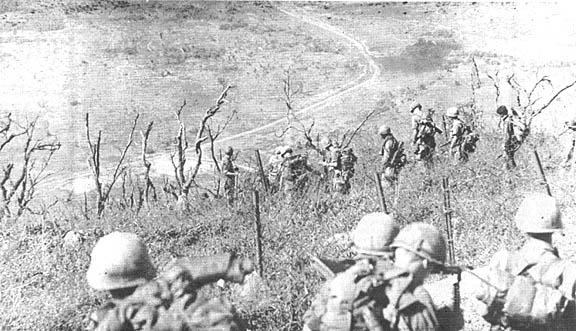 |
|
‘Operation Cliff dweller’ begins as Regulars, Vietnamese start down Nui Ba Den. |
|
|
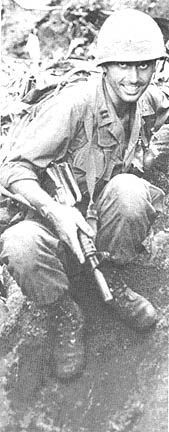 |
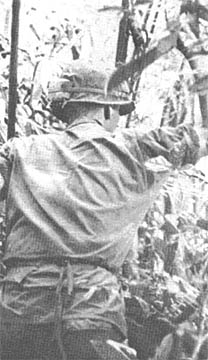 |
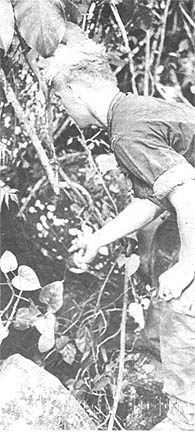 |
| CHARLIE Company commander Captain Norman Sligar has a look of knowing anticipation as he prepares to slide down a big rock. There were plenty of fatigue pants to DX after the operation. | A machete blazes a trail. | FIRE IN THE HOLE! With his grenade pin pulled and ready to drop, Private First Class John Larsen prepares to blow one of the deep holes too small to get into and investigate. Each day of the operation, the quiet of the mountain was pierced by explosions as members of the point squad had a grenade for each cave and hole they found. |
 |
Gear had to be handed down over giant rocks during the three-day trip down the mountain. |
Page 6 TROPIC LIGHTNING NEWS November 10, 1969
Brick-a-Brack for the Boonies
Dragon Supply Gets There
By PFC GREG STANMAR
CU CHI - Moving more than 150 tons of supplies, which is about the same thing
as transporting about 300 circus elephants, is a big job for the men who supply
the Golden Dragons of the 2d Battalion, 14th Infantry.
Finding room to send along some luxury items such as ice cream, cold beer and
fresh clothing makes the task doubly difficult.
SOMETIMES these precious commodities do get left behind for absolute
essentials like food and ammunition. However, eventually they do get to the men
who eagerly await them.
Captain Robert Scheifele of Columbus, Ga. is the man responsible for seeing
that the goodies get through as well as the necessities.
“Problems often arise in getting these items out to the field when a company
is in a location where they can be delivered only by air. But if we don’t make
it one day, we’ll make it the next,” Scheifele said.
“We fly about 224,000 pounds of supplies a week. Also part of the
battalion’s supply tonnage goes by truck. Three trucks a day haul a weekly 42
tons to Fire Support Base Patton II and nearby posts,” Scheifele explained.
“Its a big job, and an important one.”
DESPITE THE difficulties often posed by logistics problems, even the remote
patrol bases frequently have ice cream to serve for desert. The men have fresh
sets of clean clothes everyday, which makes taking a shower worthwhile, and two
hot meals are served everyday as well.
A PX conex is brought to the Fire Support Base once a week to supplement the
sundry packs the men receive.
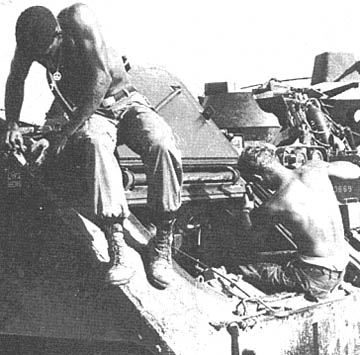 |
TOMAHAWK REPAIRMEN - Specialist 4 Robert Davis of Chicago (left) and Specialist 4 Arthur Ramsdell of Eastport, Me. work over an overworked track at Fire Support Base Rawlins. Delta Company, 4th Battalion (Mechanized), 23d Infantry is the Tomahawk repair and support element. (PHOTO BY SP4 JOHN W. FRAME) |
25th S&T Cited
The 25th Supply and Transport Battalion has earned a fourth oak leaf cluster
for its Meritorious Unit Commendation.
Battalion Commander Lieutenant Colonel William R. Strong accepted the award
recently in ceremonies at Cu Chi. The unit was cited for “demonstrating
extraordinary fortitude, determination and professional competence ... despite
adverse working conditions and constant enemy harassment.”
Aviation Bn Wins Logistic Award
CU CHI - The Commanding General’s monthly Logistic Readiness Award was
recently awarded to the 25th Aviation Battalion.
The award was presented to Lieutenant Colonel Robert R. Gosney, Commanding
Officer of 25th Aviation, by Division Commander Major General Harris Hollis.
Competition for the award includes all division battalion-size units. In
this competition the 25th Aviation Battalion accumulated a total of 92.1 points
out of a maximum 100.
Units are inspected by the divisions CMMI team, which covers such areas as:
equipment serviceability, prescribed load list and maintenance management.
Delta Tomahawks Play Key Line Support Role
By SGT BILL OBERHOLZER
TAY NINH - They may be “only” medics, maintenance personnel and cooks, but
the men of the 4th Battalion (Mechanized), 23d Infantry’s Delta Company, like
all infantry support troops, play a vital role.
Captain Jesus T. Perry of Sunny Vale, Calif., Delta Company executive
officer, puts it this way: “Although our platoons are independent of one
another, we are one company with one purpose, and that is supporting our line
companies in the field.”
IN ADDITION to maintaining operations in Tay Ninh base camp, each section has
personnel and facilities at the battalion’s fire support bases.
The line companies need mechanics on most operations to keep their APCs in
top running condition. They need cooks to provide the hot meals in the field
that look so good to a trooper who’s been leaning against a tree or a track
eating C-rations most of the week. They need medics.
And they get them.
“THERE IS at least one medic per platoon in each of the line companies,”
according to Sergeant First Class Willie White, a section sergeant. “They are
assigned to Delta Company and I assign them to a company in need of a medic.”
The cooks and mechanics are likewise distributed throughout the battalion’s
operations area, making sure that the Tomahawk infantrymen have what they need.
| SPECIALIST 6 Lawrence Joel, a combat medic, won the Medal of Honor while serving with the 173d Airborne Brigade on his first Vietnam tour in 1966. Joel won the highest honor when he treated dozens of wounded men during a 24-hour battle despite two wounds he had received in his legs. Joel is joining Tropic Lightning this month for his second Vietnam tour. |
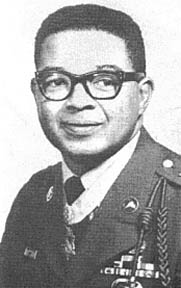 |
Ask Sgt. Certain
DEAR SARGE: I recently purchased a complete stereo sound system and set it up in
my bunker 12 feet under Tay Ninh base camp. During rocket attacks my bunkers
becomes flooded with moochers who drop in to groove on my woofers and tweeters
until the attack is over. Don’t you think they ought to dig their own bunker
and get their own sound system?
A. Sansui
DEAR SAN: There are many ways to discourage people from bothering you. You
could put a sign outside your bunker saying, “All Volunteer KPs report here.”
You could make a rule that nobody who isn’t at least an E-6 and older than 21
can come in. Or, you could buy some special bunker-clearing tapes to play in
emergencies. We would recommend anything by Guy Lombardo, Snooky Lanson,
Shelley Fabares or Stan Wolowic and his Polka Chips. Finally, as a last resort,
you could turn your set up as loud as it will go, and woof and tweet the
intruders all the way to Nui Ba Den.
DEAR SC: I am a member of a scout dog platoon. My dog Charybdis and I have been
together for nearly a year, working together, playing together, eating ham and
lima beans together. We have decided we want to be married. I have taken this
matter through the chain of command, but so far with only indifferent results.
My squad leader says it’s okay with him as long as I don’t miss any bunker
guard. My first sergeant, however, says he can’t find anything in the ARs
allowing it. Since he couldn’t find anything in the ARs forbidding it, either,
though, he sent me to the CO, who told me it was okay with him as long as I
don’t miss any bunker guard. The chaplain warned me about the problems of mixed
marriages and told me to “think very carefully before you do anything that might
affect your future.” The finance office says they don’t care as long as I give
them an address to send my allotment checks. My father wrote to ask who would
pay for the booze at the wedding reception. All of this has me confused. What
should I do?
Dog Lover
Dear Dog: It’s true that you may have some problems, such as finding suitable
housing when you get back to the World. Also, you should be warned that if Charbydis needs medical care, Army veterinary facilities are usually booked up
eight or nine years in in advance. However, there is no reason why your
relationship can’t be a happy one. You might even get in the Tropic Lightning
News.
Page 7 TROPIC LIGHTNING NEWS November 10, 1969
 |
|
Rome plow blades push back the brush in the Boi Loi Woods. |
Plows, Triple Deuce Clear Boi Loi
TAY NINH - Suspected enemy-infested jungles of the Boi Loi Woods are being
rome-plowed, exposing the pock marks of numerous engagements and the remains of
many enemy bunkers and fighting positions.
Rome plows from the 62d Engineer Battalion at Long Binh are being secured by
men of the 2d Battalion (Mechanized), 22d Infantry as the engineers plow the
jungle. From a night laager in the Boi Loi Woods itself, the plows move out
early and cut about 200 acres daily.
The plowing operations unearth old enemy positions and trails, thus reducing
future infestation by the enemy. Plowing also makes the job of patrolling the
woods easier. So far, numerous bunkers, trails and fighting positions have been
exposed.
Specialist 4 Walter B. Owen of Glenpool, Okla., a rome-plow driver, said,
“There’ aren’t as many big trees here as on other operations I’ve been on, but
the bamboo and underbrush is thicker.”
Private First Class Jerry J. Harder, Bravo Company track driver, said, “It
sure is easier to drive through with the rome plow than try and fight the brush
to make a path.”
|
Story |
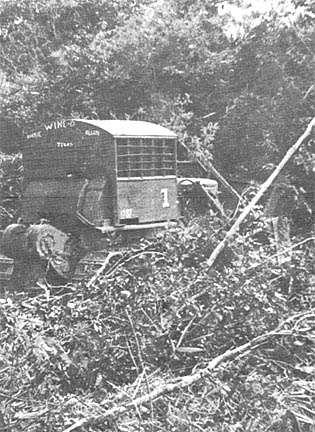 |
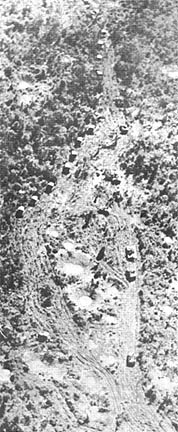 |
| The big blades cut through even thickest brush. | The big plows eat their way into the woods. |
| Triple Deuce APCs provide security for the engineers. |
 |
 |
|
The day almost over, a column of plows heads back to a night laager site. |
Page 8 TROPIC LIGHTNING NEWS November 10, 1969
Warriors’ ‘Bush Nets Four Foe
By PFC JIM WILLIAMS
CU CHI - Infantrymen are making a deadly habit of springing ambushes on
Charlie in Delta Company, 2d Battalion, 12th Infantry. Most recently it was the
Warriors of 3d Platooon.
Led by platoon leader Second Lieutenant Lawrence W. Payne of Coalinga,
Calif., Delta’s 3d Platoon moved south from Patrol Base Lorence, putting out
their claymore mines and getting settled for an all-night vigil about 1500
meters southwest of the Fire Brigade base.
Shortly after midnight, seven to eight individuals were spotted moving in a
southerly direction.
“When they came within range of our claymores, we opened fire,” said Private
First Class Dan Sargent of Boise, Ida.
Sweeping the area, the Warriors found four enemy bodies and several blood
trails.
A few days earlier, the men of the 1st Platoon of Delta Company stole the
show by amassing a body count of 19 and a hoi chanh who rallied to the Republic
of Vietnam. Their ambush was set up to the north of Fire Support Base Pershing,
not far from highway 6A.
Airborne ‘Mates’ 5 In Move
By SGT TONY CAMELIO
CU CHI - Delta Troop, 3d Squadron, 4th Cavalry recently proved again what a
fast working, closely coordinated airmobile unit can do.
Using the combined efforts of a Delta Troop OH-6A light observation
helicopter and its own aero-rifle platoon, a Delta Troop “checkmate” mission
accounted for five enemy soldiers killed, four detainees, two AK-47 rifles, two
nine millimeter pistols, one large Chicom antipersonnel mine, several
fragmentation grenades, and large quantities of medical supplies.
Captain Wayne White, Delta Troop’s aero-rifle platoon leader, said, “In a
checkmate mission my men are dropped into an area marked by the LOH and then
check out possible enemy positions. If we encounter any Vietnamese personnel we
carefully check them out for identification.”
“During the last two days, our checkmate missions have been extremely
profitable,” continued White. “We’ve been able to pinpoint Charlie’s location
because he was anxious to shoot at one of our low flying light observation
helicopters. The LOH finds the enemy and then we flush him out.”
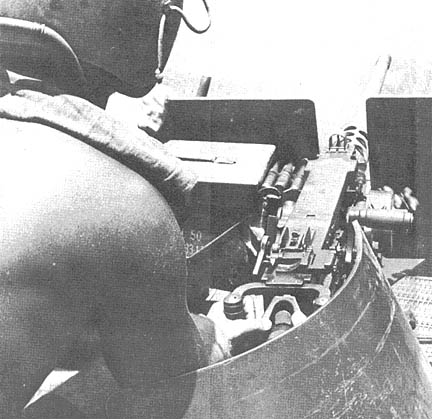 |
UNLEASHING a lethal barrage of .50 caliber fire toward an enemy position near the base of Nui Ba Den, Sergeant Wally Baker of Boston, Mass., a track commander of the 2d Battalion, 34th Armor sits high in his tank. The Dreadnought Armor has been flushing the enemy from his one-time mountain sanctuary. (PHOTO BY SP5 CARL DETRICK) |
Perfect One-Bounce Landing
C-and-C Pilot Averts Chopper Crash
By 1LT J.J. RICHARDS
CU CHI - Warrant Officer Gene Trask of Middleton, Mass., Little Bears’ pilot
of the 2d Brigade’s command-and-control ship, was flying at an altitude of 600
feet a mile west of Cu Chi recently when things started going wrong.
“We were near the rubber plantation almost over the contact area. Suddenly
there was a terrific jolt. The gears were tightening. I heard a very loud high-pitched
grinding sound. Then the master caution light flashed on,” Trask said.
THE HYDRAULIC line had been cut. Without hydraulic fluid the controls used
to steer the chopper were almost impossible to move. The collective, pedals,
and cyclic which regulate up and down, right and left and hover movements could
be operated only with a great deal of pushing and pulling.
“I was a bit shaken at first,” Trask said. “Then I settled down. I went
through the standard emergency procedure. I checked my instruments to find out
what the problem was. I called Cu Chi tower. Crash trucks were sent out to the
landing strip.
Trask decided that a slow, very shallow or low angle of approach would be
best. This would require the least amount of maneuvering. Two feet off the
runway the collective would no longer move. The chopper landed with a single
bounce. Trask shut down, got out and breathed a sigh of relief.
WARRANT OFFICER Gary Thompson of Hatch, N. M., co-pilot of the Fire Brigade’s
C-and-C ship, said “Once Gene realized what was happening he calmed down and
just ‘greased’ the chopper on in.”
Captain Carl Savatiel of Louisville, Ky., 2d Brigade artillery liaison
officer, who was aboard the ship at the time, said, “I sure didn’t want to go
down in the place where we were. I was sure happy we had a good pilot to get us
back safely.”
| 1969 Tropic Lightning Yearbook Remember the post-Tet offensive? Mole City? The Diamonds? Frontier City? Crook? Tay Ninh City? The 1969 Tropic Lightning Yearbook, a 220-page pictorial history of the 25th Infantry Division’s fourth year in Vietnam, can now be ordered through unit Tropic Lightning Association representatives. Price is $5. Eighty pages will be in color. Each division unit will be featured in a section of its own. Delivery is expected in February and the book can be mailed directly from the publisher anywhere in the world. |
 |
| DO MACHINEGUNS FLOAT? Specialist 4 Robert L. Emery of Marine City, Mich., of the 2d Battalion, 14th Infantry looks as if he is about to try and find out on this stream crossing near Trung Lap. (PHOTO BY SP4 FRANK DITTO) |
Thanks to:
Karl Karlgaard, 2nd Bn., 27th Inf., and a Tropic Lightning News correspondent,
for sharing this issue,
Kirk Ramsey, 2nd Bn., 14th Inf. for creating this page.
This page last modified 01-31-2005
©2005 25th Infantry Division Association. All rights reserved.